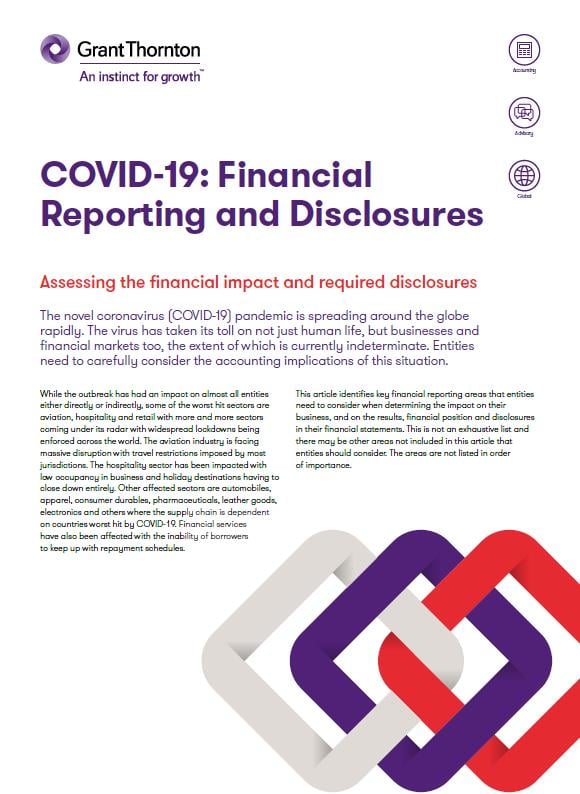-
Accounting Advisory
Our accounting advisory team help businesses meet their complex financial reporting requirements. The team can support in applying new financial reporting standards, IFRS/ US GAAP conversions, financial statement preparation, consolidation and more.
-
Payroll
Our team can handle your payroll processing needs to help you reduce cost and saves time so that you can focus on your core competencies
-
Managed accounting and bookkeeping
Outsourcing the financial reporting function is a growing trend among middle market and startup companies, as it provides a cost-effective way to improve the finance and accounting function. Our team can help with financial statement preparation, consolidation and technical on-call advisory.
-
Accounting Advisory
Our team helps companies keep up with changes to international and domestic financial reporting standards so that they have the right accounting policies and operating models to prevent unexpected surprises.
-
Crypto Accounting Advisory Service
Our team can help you explore appropriate accounting treatment for accounting for holdings in cryptocurrencies, issuance of cryptocurrencies and other crypto/blockchain related accounting issues.
-
ESG Reporting and Accounting
As part of our ESG and Sustainability Services, our team will work with you on various aspects of ESG accounting and ESG reporting so that your business can be pursue a sustainable future.
-
Expected Credit Loss
Our team of ECL modelling specialists combine help clients implement provisioning methodology and processes which are right for them.
-
Finance Transformation
Our Finance Transformation services are designed to challenge the status quo and enable your finance team to play a more strategic role in the organisation.
-
Managed Accounting and Bookkeeping Services
Outsourcing the financial reporting function is a growing trend among middle market and startup companies, as it provides a cost-effective way to improve the finance and accounting function. Our team can help with financial statement preparation, consolidation and technical on-call advisory.
-
Business Tax Advisory
Our business tax team can help you navigate the international tax landscape, grow through mergers and acquisitions, or plan an exit strategy.
-
Corporate Finance
Our corporate finance team helps companies with capital raising, mergers and acquisitions, private equity, strategic joint ventures, special situations and more.
-
Financial Due Diligence
From exploring the strategic options available to businesses and shareholders through to advising and project managing the chosen solution, our team provide a truly integrated offering
-
Valuations
Our valuation specialists blend technical expertise with a pragmatic outlook to deliver support in financial reporting, transactions, restructuring, and disputes.

-
Sustainability with the ARC framework
Backed by the CTC Grant, businesses can tap on the ARC Framework to gain access to sustainability internally, transform business processes, redefine job roles for workers, and enhance productivity. Companies can leverage this grant to drive workforce and enterprise transformation.

-
Business Tax Advisory
Our business tax team can help you navigate the international tax landscape, grow through mergers and acquisitions, or plan an exit strategy.
-
Corporate Tax Compliance
Our corporate tax teams prepare corporate tax files and ruling requests, support you with deferrals, accounting procedures and realise tax benefits.
-
Tax Governance
Our Tax Governance Services are designed to assist organisations in establishing effective tax governance practices, enabling them to navigate the intricate tax environment with confidence.
-
Goods and Services Tax
Our GST team supports organisations throughout the entire business life-cycle. We can help with GST registration, compliance, risk management, scheme renewals, transaction advisory and more.
-
Transfer Pricing
Our Transfer Pricing team advises clients on their transfer pricing matters on and end-to-end basis right from the designing of policies, to assistance with annual compliance and assistance with defense against the claims of competing tax authorities.
-
Employer Solutions
Our Employer Solutions team helps businesses remain compliant in Singapore as well as globally as a result of their employees' movements. From running local payroll, to implementing a global equity reward scheme or even advising on the structure of employees’ cross-border travel.
-
Private Client Services
Our private client services team provides a comprehensive cross section of advisory services to high net worth individuals and corporate executives, allowing such individuals to concentrate on their business interests.
-
Welfare and benefits
We believe that a thriving team is one where each individual feels valued, fulfilled, and empowered to achieve their best. Our welfare and benefits aim to care for your wellbeing both professionally and personally.
-
Career development
We want to help our people learn and grow in the right direction. We seek to provide each individual with the right opportunities and support to enable them to achieve their best.
There are several accounting considerations the COVID-19 pandemic has triggered in relation to IFRS 9. In our view one of the most significant is in relation to hedge accounting and highly probable cash flows.
Under IFRS, if an entity is applying hedge accounting as part of its risk management strategy, it will follow the hedging requirements in IFRS 9 ‘Financial Instruments’. However, it could still be applying the requirements in IAS 39 ‘Financial Instruments: Recognition and Measurement’ in certain circumstances. In both cases, a key criterion relating to cash flow hedges over forecast transactions relates to the requirement for the hedged cash flows to be highly probable. This is set out in IFRS 9.6.3.3.
During the COVID-19 pandemic, an entity therefore may need to consider:
- If the hedged cash flows still meet the highly probable assessment (if not, the hedging relationship will have to be discontinued, in its entirety or only in part in accordance with IFRS 9.6.5.6).
- If the cash flow hedge reserve includes amounts that should be moved to profit or loss upon discontinuation of the hedge.
- If there is any hedge ineffectiveness to recognise in the profit or loss for hedges that continue to meet the qualifying criteria to apply hedge accounting.
Do hedged cash flows still meet the highly probable assessment?
The requirement to meet the highly probable assessment is crucial. The impact of COVID-19 needs to be taken into consideration in the highly probable assessment, based on the facts and circumstances that exist at the end of the reporting period.
For instance, entities frequently enter into cash flow hedges of forecast transactions, such as the purchase and sale of raw materials and inventories. A forecast transaction can be designated as a hedged item only if it is highly probable to occur. The highly probable assessment is therefore likely to be significantly impacted. The impact of some or all of the hedged transactions ceasing to be highly probable could vary depending on the facts and circumstances, varying from hedge accounting failure, partial hedge discontinuance or significant ineffectiveness.
The impact of this is likely to be significant for any entities which hedge forecast transactions where the volumes are impacted by COVID-19. It may be that derivatives were taken out at earlier times where the hedged levels were considered highly probable at the time of hedge inception, but due to COVID 19 in the intervening period the highly probable cash flows will now likely to be significantly reduced.
This can also be relevant to cash flow hedges over interest rate risk. While the hedged item in many cases will relate to interest cash flows on debt which is from committed facilities, projected covenant failure due to COVID 19 could impact the hedge accounting assessment. Similarly, if the hedged cash flows included a forecast issuance of debt, COVID 19 could impact the highly probable assessment of this.
What is meant by highly probable for IFRS 9?
The term 'highly probable' is not defined in IFRS 9 but is interpreted to have a much greater likelihood of occurring than 'more likely than not'. The meaning of the term has not changed between IAS 39 and IFRS 9 and IG F3.7 accompanying IAS 39 provided guidance on the meaning.
Assessing whether a forecast transaction is 'highly probable' and/or 'expected to occur' requires judgement based on individual facts and circumstances. Although IFRS 9 does not specify a quantitative threshold to define these terms, 'expected to occur' might be interpreted as more likely than not (ie a probability of over 50%), and 'highly probable' as being much closer to 100%.
The interpretation guidance mentioned above contained some helpful guidance to interpret 'highly probable' with respect to hedge accounting. That guidance indicated an assessment of the likelihood that a forecast transaction will take place is not based solely on management's intention, it should be supported by observable facts and the attendant circumstances, such as:
- the frequency of similar past transactions
- the financial and operational ability of the entity to carry out the transaction
- whether substantial commitments of resources have been made to a particular activity
- the extent of loss of disruption of operations that could result if the transaction does not occur
- the likelihood that transactions with substantially different characteristics might be used to achieve the same business purpose, and
- the entity's business plan.
Overall COVID-19 will mean that in many industries, there will be a lower confidence level on sales or purchases. This will depend on facts and circumstances, including the nature of the products and services and the extent to which demand and the ability to supply has been impacted by the pandemic and therefore the level of uncertainty on a forward-looking basis with reference to the hedged item.
What should you do when a hedging relationship is discontinued?
If a hedging relationship is discontinued because a forecast transaction is no longer highly probable, the entity needs to assess whether the transaction is still expected to occur. Just because the hedged transaction is no longer highly probable does not automatically mean that all related other comprehensive income reserves should be transferred to the profit or loss immediately upon the discontinuance or partial discontinuance of the hedging relationship.
Potential sources of ineffectiveness in cash flow hedges
COVID-19 also introduces potential sources of hedge ineffectiveness where interest payments on loans are subject to a deferral of forgiveness. In addition, many loans contain interest floors (eg interest rate is LIBOR +1% but loan contract says LIBOR is floored at 0%). Where interest rates fall, this increases the likelihood of the interest floor impacting the future cash flows as there may be no corresponding floor in the hedging instrument. This causes a source of hedge ineffectiveness because when some repayments are postponed to a later date for the hedged loan, there could have several periods where the interest cash flows on the swap have nothing to match on the hedged instrument’s side, which could result in ineffectiveness.
In addition, the increased credit risk as a result of COVID-19 could affect the hedge effectiveness. The credit risk of the counterparty could affect the hedge effectiveness testing and the measurement of hedge effectiveness, and this is true both for hedging instruments and hedged items. For instance, if the credit risk of the counterparty to an uncollateralised derivative has deteriorated as a result of COVID-19 (eg it being severely downgraded by external rating agencies such as Moody’s or S&P), the hedging relationship will most likely have to be discontinued.
In these situations the qualifying criterion for hedge accounting in IFRS 9 which is 'the effect of credit risk does not dominate the value changes that result from that economic relationship' will probably no longer be met. Another example would be where the hedged asset becomes credit impaired as a result of the pandemic: here the hedging relationship would cease if the hedge no longer met the requirements of hedge effectiveness.
Another source of ineffectiveness, in the case of hedging foreign exchange risk of expected foreign exchange sales or purchases, is when the date of the future transaction is postponed (while the cash flow date on the hedging derivative remains unchanged). The calculation of the resulting ineffectiveness would depend on how exactly the hedged transaction is documented. Although forecast transactions related to inventory do not pose credit risk, the credit risk of the possible counterparty to the anticipated transaction can indirectly affect the assessment of whether the transaction is highly probable.
Potential non-recoverability of OCI reserves
If an entity expects that all or a portion of the other comprehensive income (OCI) reserve (that is a loss) will not be recovered in the future, it should straightaway reclassify the amount that is not expected to be recovered into profit or loss as a reclassification adjustment. This is the case even for hedges that remain in place.
Situations where this potentially could happen during the COVID pandemic are as follows:
- a hedge of future purchases of goods whereas the expected reselling price of these goods would not permit to recover the current loss in OCI
- a hedge of interest rate risk of floating rate financial asset that has been impaired.
What disclosure requirements?
An entity is required to apply the disclosure requirements in accordance with IFRS 7 ‘Financial Instruments Disclosure’ for those risk exposures that an entity hedges and for which it elects to apply hedge accounting. In our view, hedge accounting disclosures should provide information about:
- an entity’s risk management strategy and how it is applied to manage risk
- how the entity’s hedging activities may affect the amount, timing and uncertainty of its future cash flows
- the effect that hedge accounting has had on the entity’s Statement of Financial Position, Statement of Other Comprehensive Income and Statement of Changes in Equity, including amounts relating to hedge accounting that have been recognised in profit or loss, and
- the impact of COVID-19 on hedge ineffectiveness.
- the impact of COVID-19 on hedge discontinuation and the resulting transfers of OCI reserves to the profit or loss (the nature of forecast cash flows that are no longer highly probable, amounts relating to discontinued derivatives and other comprehensive income transfers).
How we can help
Preparers of financial statements will need to be agile and responsive as the situation unfolds. Having access to experts, insights and accurate information as quickly as possible is critical – but your resources may be stretched at this time. We can support you as you navigate through accounting for the impacts of COVID-19 on your business.
Now more than ever the need for businesses, their auditors and any other accounting advisors to work closely together is essential.
If you would like to discuss any of the points raised, please speak to your usual Grant Thornton contact Chetan Hans.



